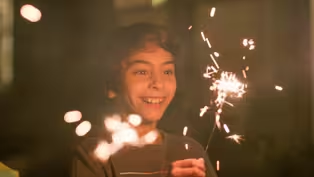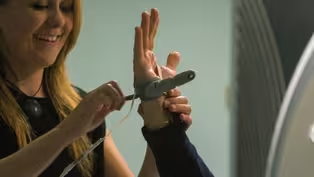
How AI is Transforming How We Create and Engage with Art
Clip: Episode 4 | 8m 1sVideo has Closed Captions
Ari explores the powerful potential of AI to transform how we create art going forward.
Ari explores the powerful potential of AI to transform how we create art going forward. He speaks with musician Grimes and later experiences an immersive AI powered live art exhibit in Brooklyn.
Problems playing video? | Closed Captioning Feedback
Problems playing video? | Closed Captioning Feedback
Supported by the Hoveida Family Foundation and The Rosalind P. Walter Foundation.

How AI is Transforming How We Create and Engage with Art
Clip: Episode 4 | 8m 1sVideo has Closed Captions
Ari explores the powerful potential of AI to transform how we create art going forward. He speaks with musician Grimes and later experiences an immersive AI powered live art exhibit in Brooklyn.
Problems playing video? | Closed Captioning Feedback
How to Watch A Brief History of the Future
A Brief History of the Future is available to stream on pbs.org and the free PBS App, available on iPhone, Apple TV, Android TV, Android smartphones, Amazon Fire TV, Amazon Fire Tablet, Roku, Samsung Smart TV, and Vizio.
Buy Now
Providing Support for PBS.org
Learn Moreabout PBS online sponsorship- In the 1800s, there was a mathematician, Ada Lovelace, and in the footnotes of papers that she was translating about one of the very first computers, she starts describing a computer that someday may think just like humans.
This is really important, because for hundreds of years, we've been trying to figure out how to replicate life, how to replicate the human experience.
- The machine uses only two sounds produced electrically.
Say, "She saw me."
- She saw me.
- Slowly over time... - Hello, I am Macintosh.
- We've started to make inroads developing computers that feel more human, that seem like they might be thinking.
[computer chimes] If you're talking to a chatbot and that chatbot appears to exhibit emotion or appears to want to connect with you on a deeper level, would you say that that chatbot is human?
- Boy, that really blows my digital mind.
- Now, most people would say no.
They would describe it as a really humanlike interaction.
But we're still using the word "human."
All of these different philosophical questions, they actually matter a lot, because these are the very research ideas that are being pursued as we're building out these technologies that eventually are gonna impact all of our lives.
♪ ♪ [dramatic music] ♪ ♪ - Someone who has been at the forefront of this work is musician Grimes, and I wanted to get her perspective on where we are in this evolution, the creative potential she sees, and the importance of hope in what comes next.
♪ ♪ As an artist, what do you feel is, like, the moral imperative of this moment in time?
- I did a poll recently on Twitter where I asked people, like, if they had any purpose in their life... - Mm-hmm.
- And like, it was like, 70% of people said no or something.
- Wow.
- Like, if there's ever a moment to have a feeling of purpose, I think it would be now, because what we do and the things we create over the next few decades will probably shape, like, all minds going forward for the rest of time.
And so if there was ever a time to have purpose, I think it's really, yeah, like, right now.
- How should artists, then, be thinking about how they work with technology, and really, in many ways, specifically AI?
- I really think there is actually, like, a beautiful amount of opportunity here right now.
[vocalizing] When I started making music, there was sort of this revolution happening in music production.
More people were being able to make music at home on their computers.
And I think there was a massive democratization of who was allowed to make music that, like, I took huge advantage of that was fully the byproduct of technology.
And I think this is about to extend to all of art.
You know, when I see some of the new stuff coming with AI, like video to video and text to video and all this stuff that, like, is about to explode.
And I think it's so beautiful that, like, when everyone has the same tools that can make professional quality stuff, then, like, you get to see the actual talent, like, really rise to the top.
- You've said consciousness is sacred.
- Yeah.
- Tell me more about that.
- I think because we're all alive, we all, like, take it for granted that, like, I can think, and I have agency, and I can feel.
You know, if we're really alone in the universe, which it seems like, I think the thing that's happening here right now, like, this is, like, literally God or something.
This is, like, the universe waking up and perceiving itself.
I think the single most important thing is to make sure that this spark that exists here on planet Earth gets to be elsewhere.
And I don't even really care if it's biological life or digital life or something like that.
I--I'm really a proponent of, like, keeping the humans alive.
But, like, if it's silicon-based life that goes out there, I think that's just as good.
I just--I think the universe is empty and quiet, and it wants to be woken up and filled with beautiful things.
- It makes me excited to think that we really are on the threshold of wild and wonderful new ideas about who and what we can become.
But if we're gonna create the futures we want to see for our kids and grandkids, new technologies will only take us so far.
How we choose to use them matters more than ever.
In Brooklyn, a group of artists are using AI to create an immersive art experience aimed at examining our relationship with these tools in fascinating new ways.
- What we're seeing today is a collected work of what Ouch!
Collective calls data generative painting.
What that fundamentally means is that they in their studio took enormously large data sets-- millions of lines of text, millions of paintings, petabytes and petabytes of data-- fed them into a computer, and let the computer seek out patterns within it.
The computer then generates new data.
And then the folks at Ouch!
Collective feed that into software, and the software puts it on the walls.
Through these powerful algorithms that they built, they could take the human experience in total, right?
Massive data sets, and you could learn something.
[soft music] So this is the server room.
This is where all the stuff lives that operates all the stuff in there.
So the EEG takes six different types of brainwave data.
Each of those different dimensions gets assigned something to manipulate within the visual palette, right?
So it could be that, you know, the amplitude of the wave is the thing that changes the color frequency.
All it takes is a little bit of human input to say, "Okay, we'll make a scene with these shapes or with this patterning."
But the possibilities are endless.
It's only a matter of sort of the length of your creativity.
[somber music playing] ♪ ♪ When we have a large audience, we'll have the audience wear heartbeat monitors on their wrists.
Those get fed into the computer, and those start to manipulate the visuals as well.
If the goal is great collective experience, which I would hope immersive art should be, we get ever closer to it when we incorporate audience into performance as well.
What we've really been able to do is tap into the feedback loop of the human soul.
That musician is having an emotional response to whatever they're doing in the moment, whether that's the music itself, whether that's the audience's reaction to the music, whether it's the visuals on the wall.
They're having an emotional reaction.
♪ ♪ - It's a profound feeling to experience both humans and machines collaborating in real time.
This is just the beginning.
And as these tools continue to evolve, expanding our ability to imagine and create, what will we choose to use them for?
What new possibilities will we unlock?
And what kind of human and nonhuman potential is waiting to be unleashed?
Video has Closed Captions
Preview: Ep4 | 30s | What does it mean to be human in the 21st century? (30s)
How New Forms of Human Augmentation Could Affect Our Brains
Video has Closed Captions
Clip: Ep4 | 9m 9s | Ari tries a “third thumb” and explores how new tech is reshaping our idea of being human. (9m 9s)
Providing Support for PBS.org
Learn Moreabout PBS online sponsorshipSupport for PBS provided by:
Supported by the Hoveida Family Foundation and The Rosalind P. Walter Foundation.
















